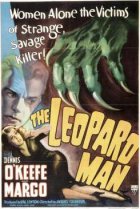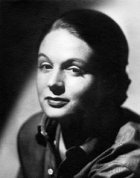
The Leopard Man Page #6
- APPROVED
- Year:
- 1943
- 66 min
- 467 Views
INT. UNDERTAKING PARLOR - DAY (AS SEEN THROUGH THE WINDOW)
This shop occupies an ordinary store building. The display
window contains a solitary wreath of gilded leaves. Behind
this wreath is a green baize curtain. The shop itself has a
sad air of unctuous gentility. On the left side of the room
are coffins on polished brass tressels. These coffins are
half open to reveal the luxurious satin linings. In the back
is a roll-top desk and swivel chair. In the rear of the shop
is a door leading to the embalming room. This is curtained
with the sane green baize. Over this whole interior is the
eerie moire light that comes through the water-flowing
window.
Uncomfortable and stiff in their grief, we see the Delgados.
The fat Senora, the little boy and the father in his stiff
blue serge Sunday suit, stand near the wall. With them is a
nun in the sweet, sad costume of the Carmelite order. At the
other side of the room stands Kiki, somewhat abased, and very
ill at ease in the presence of the Delgados' grief.
The window cleaner steps closer to the glass, lifts up his
long handled squeegee and opens up another strip beside the
first.
INT. UNDERTAKING PARLOR - DAY
MED. CLOSE SHOT of the doorway taking in the Delgado family.
Senora Delgado is weeping, with tears running unchecked down
her big flat cheeks. Her husband, unable to express his
grief, stands twisting a cheap velour hat in work-gnarled
hands. The little Delgado boy, unable to comprehend the
finality of death is interested and quick-eyed, letting his
glance rove from one object of interest to another, then
suddenly bored, as is the manner of children, distracts
himself by making the leopard shadow on the wall.
From the other room we can hear, the sound of men's voices,
not clearly distinguishable, but growing in clarity. Kiki
opens her purse, fumbles out a little soiled sheaf of bills
and crosses the room. She hands the money to the nun.
KIKI:
(in a half whisper)
Sister, I'd like the family to have
this -- might help with the funeral
expenses.
The nun smiles, nods her head and tucks the money up under
her sleeves. Kiki crosses back to the other side of the room.
Midway through this action, the voice in the other room has
risen in volume and clarity so that we hear the coroner
speaking. From behind the green baize curtain the words come
in that solemn, yet routine fashion, which is the specialty
of county clerks and other minions of the law.
CORONER'S VOICE
presented before me on this, the
tenth day of April, I hereby
declare that Teresa Guadalupe Maria
Delgado was brought to her death by
violence, resulting from the
release of a wild animal, a
leopard, purportedly on theatrical
exhibition in this city -- Death by
accident.
As the last word is spoken, Jerry makes his appearance
through the doorway. His face is drawn and earnest,
reflecting the ordeal of looking at the mutilated remains of
the young girl. He crosses the room toward Kiki.
MED. SHOT of Jerry as he takes his place beside Kiki. He
looks at her as if seeking some comforting sign of
friendliness. She keeps her eyes purposely averted from him.
MED. SHOT. Through the curtained doorway come the coroner and
Robles. The coroner carries a sheaf of papers in his hand.
Coming through the doorway quickly, he turns and seats
himself at the desk in order to sign and seal these
documents.
Chief Robles, with his uniform cap in his hand, goes over to
the Delgado family. In his face we can see the sympathy and
feeling he has for his fellow townsmen. Fe puts his arm about
Delgado's shoulder and embraces him with that peculiar
Mexican embrace in which the hand and arm thump the
embraces's shoulders.
ROBLES:
It's all right, my friend. It is
the will of God.
The genuineness of his sympathy and the sincerity of his
voice take the banal touch from these simple words. Jerry
looks on with interest. He turns to Kiki.
JERRY:
(sotto voce)
Suppose I slip them a few bucks �
for the funeral expenses.
KIKI:
Don't be soft.
She pulls sharply at his arm to emphasize the point. He
shrugs, abashed.
From the inner room a fourth man comes out, a medium sized
gentleman in a light gray business suit with a felt hat in
his hand. His face seems stiff and he walks a little bit
unsteadily. Passing Jerry, he extends his hand and pats
Jerry's arm.
GALBRAITH:
An unfortunate accident. Nobody
blames you, Mr. Manning. You
mustn't feel badly.
Jerry nods; not at all anxious for further condolences.
Galbraith goes on to stand in the doorway. Robles leaves the
Delgado family and comes over to where Jerry and Kiki are
standing.
ROBLES:
You can go now, Manning. There is
no way we can hold you legally
responsible.
JERRY:
Thanks, Sheriff.
Robles passes on a step or two, and then with a glance at
Jerry.
ROBLES:
That leopard's got to be found. I'm
forming a posse. I can use help. -
From the doorway, Galbraith answers quickly.
GALBRAITH:
Count me in.
Jerry makes an impulsive move forward -- then stops himself.
JERRY:
(shaking his head)
I haven't done any posse work since
last time I rode with Toni Mix at
the old Bijou Theatre -- aged six,
If you're interested,
ROBLES:
Go on foot.
JERRY:
It's not for me.
(grinning)
I'm literally and figuratively a
tenderfoot.
He lifts one foot and pats the ankle to illustrate his point.
Robles passes on and out of the doorway, Galbraith joining
him. With a backward look at the Delgado family, and a little
hesitantly and slowly, Jerry and Kiki also leave the funeral
parlor.
EXT. UNDERTAKER'S PARLOR - DAY
MED. CLOSE SHOT - Jerry and Kiki as they stand in the center
of the sidewalk.
JERRY:
I suppose he was trying to make me
feel bad.
KIKI:
And I suppose you don't feel bad!
Before Jerry can protest.
KIKI:
Who was the other man?
JERRY:
I don't know �� a witness. He
seemed to know something about
animals -- you know -- expert
testimony.
KIKI:
What did he have to do -� look at
the body?
JERRY:
We all, had to look at the body. It
was awful, Kiki -- awful!
Kiki makes a movement as if to put her hand comfortingly on
his sleeve, then changes her mind, dropping her hand.
MED. SHOT - Undertaking Parlor - as the Delgado family
emerges and starts down the street. The mother and father
walk ahead, the father's arm about the mother's shoulder.
They are followed by Pedro, his hand in the Nun's hand as
they walk together. Kiki and Jerry fail to see them, and it
is necessary for Senor Delgado to ask for room.
SENOR DELGADO:
Excuse, please.
Jerry and Kiki move hurriedly out of the way to let the
little group of mourners go past. Jerry and Kiki stand
watching them for a moment.
CLOSEUP of Jerry, his expression betraying anxiety and
indecision.
DISSOLVE:
INT CLO-CLO'S DRESSING ROOM - LATE AFTERNOON
LARGE HEAD CLOSEUP of Maria. The beautiful face of the
fortune teller, coifed and framed in the folds of a shawl,
looks pure and Madonna�like. Her downcast eyes add to the
holy feeling. Then, suddenly, her hand comes up and puts a
lighted cigarette droopingly between her lips. The Madonna
pose is shattered as though a stone had been thrown into
still water.
Translation
Translate and read this script in other languages:
Select another language:
- - Select -
- 简体中文 (Chinese - Simplified)
- 繁體中文 (Chinese - Traditional)
- Español (Spanish)
- Esperanto (Esperanto)
- 日本語 (Japanese)
- Português (Portuguese)
- Deutsch (German)
- العربية (Arabic)
- Français (French)
- Русский (Russian)
- ಕನ್ನಡ (Kannada)
- 한국어 (Korean)
- עברית (Hebrew)
- Gaeilge (Irish)
- Українська (Ukrainian)
- اردو (Urdu)
- Magyar (Hungarian)
- मानक हिन्दी (Hindi)
- Indonesia (Indonesian)
- Italiano (Italian)
- தமிழ் (Tamil)
- Türkçe (Turkish)
- తెలుగు (Telugu)
- ภาษาไทย (Thai)
- Tiếng Việt (Vietnamese)
- Čeština (Czech)
- Polski (Polish)
- Bahasa Indonesia (Indonesian)
- Românește (Romanian)
- Nederlands (Dutch)
- Ελληνικά (Greek)
- Latinum (Latin)
- Svenska (Swedish)
- Dansk (Danish)
- Suomi (Finnish)
- فارسی (Persian)
- ייִדיש (Yiddish)
- հայերեն (Armenian)
- Norsk (Norwegian)
- English (English)
Citation
Use the citation below to add this screenplay to your bibliography:
Style:MLAChicagoAPA
"The Leopard Man" Scripts.com. STANDS4 LLC, 2025. Web. 4 Mar. 2025. <https://www.scripts.com/script/the_leopard_man_896>.







Discuss this script with the community:
Report Comment
We're doing our best to make sure our content is useful, accurate and safe.
If by any chance you spot an inappropriate comment while navigating through our website please use this form to let us know, and we'll take care of it shortly.
Attachment
You need to be logged in to favorite.
Log In